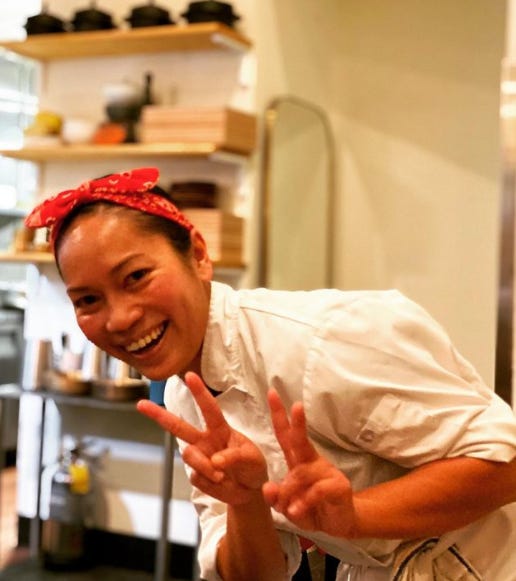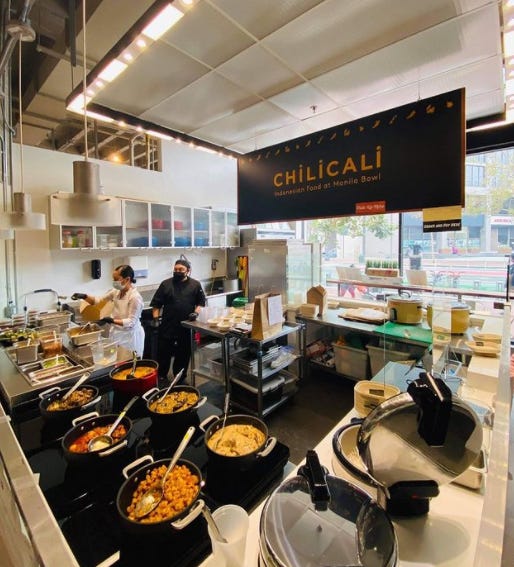Lesehan Talk 03 with Siska Silitonga of ChiliCali: To Embrace and To Stay Grounded
Chopping chilies is Siska's job description ever since she helped her mother's little cafe. But, how does she define her own journey to establish ChiliCali?
Raised in the kitchen, Siska Silitonga helped her mother to chop chilies and garlic for her mother’s little cafe in Tanjung Priok (Priok Port), Jakarta. She witnessed the chaotic energy in the kitchen since she was a little; arguing over money, the inconsistency of recipe, and the fast-paced life behind the stove. She knew that it was not the life that she wanted. The kitchen belongs to her mother. She was born for something bigger than a patch of a kitchen.
“I had no choice. It was either I stayed alone at home or I could go with my mom and my aunts to the cafe.”, told Siska.
Her memory of the kitchen is not picturesque. She wanted to escape that, so she told her mother, “I want to be an artist”. Her statement was vague, but she knew that it would lead her somewhere; far from mundane life, far from a chaotic life.
“I went to study Mandarin in Beijing, China, in 1998. I wanted to prove that I didn’t hate Chinese. It was during the economic crisis that led to scapegoating the Chinese-descent Indonesian community. My mother was relieved that at least her daughter was not protesting in the streets anymore. When I moved to Beijing, China was not as open as today. I had to learn to speak Chinese from scratch because my host family only spoke Chinese. Then, I continued to study and work in Beijing.”
Siska’s memory of her life in Beijing is full of colors, people, and an intersection of cultures. She stayed in a student dorm with other international students; tasting her first African food, having a warm hotpot in cold winter evenings, and cooking her own food, without having the chaos like those back home.
After working as a journalist in China, Siska decided to continue studying in United States. Adapting again to a new place, new experience, new things to learn, and people to meet.
So, what was the beginning of ChiliCali?
It started from my place. I was seeing all these pop-up restaurants, where a chef can rent a restaurant for one day, invite people, and serve the food there. It was an exciting idea. I thought that I could do something like that. But how could I cook something that’s familiar to me, while also educating Americans about it? I thought it should be something that’s easy to compare. My first menu was Bakso (meatballs) that I made from scratch - rolling the meatballs and making the bone broth from Oxtail. It was kind of like the hotpot I had in China!
How was the Indonesian restaurant scene in California at that time?
Before I opened up ChiliCali, there were two and one of them was in Berkeley. But right around before I was going to establish ChiliCali, they decided to shut down the restaurants. One of them said that it was too difficult to introduce Indonesian food to locals. So I started to question
“Why are Japanese and Thai food accepted here? Why can’t people accept Indonesian food?”
Maybe it was because all this time, we didn’t reach out the way we should be. We were speaking in Indonesian through food, but it was not translated well. So, how can I translate Indonesian food to the locals?
That’s my mission. Introducing Indonesian-inspired food using local produce.
Then, that’s reflected in the name, ChiliCali?
Exactly. My friend, this start-up guy, created that name for my business. I was talking about this mission; using local produce and working with local producers. Then he asked me what’s my main ingredient.
“It’s Chili!”
So, that’s it. ChiliCali. It’s an umbrella for this business; a restaurant, a catering, and jars of sauces or bumbu.
Why is it important to work with local produce?
It requires less work. It’s seasonal and it’s fresh. I try to keep in mind that the ingredients for all these Indonesian foods I cook do not have to be exactly the same. It’s just natural. You’re in a different place, so you’ll get different ingredients.
Then, you’ll get the chance to work with local producers, you contribute to the place where you are now, and you know what you’re getting. I got my seafood and fish from Water2Table , fresh produce from GreenLeaf , and the meat from Tara Firma Farms . It’s amazing to work with what’s available surrounding you and local businesses.
This pandemic has been hard, but we’re working on it. Now, I serve the menu monthly. So I work with what’s available in nature. When it was crab season, we served Kepiting Saos Padang. Now it’s Black Cod season, so I’m thinking of making something else.
Your mind gotta work on that. It’s not very easy to plan?
Yes. That’s the excitement! Even when it’s in season, there still could be something like rain. One time, it was crab season but the fishermen I worked with couldn’t go fishing because it was raining so I had to apologize to my customers and told them that we were not going to serve it that day. I’m glad that my customers could understand that. I think that when there is clear communication and proper customer education, they will understand and respect what we’re doing.
That’s what I really want to encourage for the Indonesian diaspora out there. Try to work with local produces, local producers, and hire local staff. Embrace wherever you are.
I’ve seen many Indonesian caterings and pop-ups in San Francisco now!
This one is pretty new. It was started last year during this pandemic. Before I don’t think I’ve seen many, but now, whoa. I guess it was because we stayed at home, so we could order food, get it delivered, and maybe some people need some more income. It’s so exciting! Some of these people reach out to me. We ordered each other food and I could taste their food too. There really is no competition here.
It’s just so amazing when we drop food to each other and share some stories. Some Indonesians I know are starting to get serious in their food business, so that’s great! This is what I want to say for many Indonesians here. We really should leave an unhealthy competitive attitude; crab mentality! We are all doing different things and we cannot do everything all at once. Instead of competing, let’s just help each other.
I can make Bakso, but I don’t have time to do that. So I’d prefer to order. I have a friend who’s making Martabak now, so that’s great? I can’t make that. ChiliCali can’t make that. When everybody works together with their own specialty, we can share so many flavors from home. Isn’t it beautiful?
Indonesian Seafood Stew in Saos Padang
Babi Guling Bali (Balinese Roasted Pork)
I see that ChiliCali spoke up about Black Lives Matter. How do you see the importance of this as Indonesian-American?
Being a part of the food chain is one thing and as an Indonesian-American, it’s another thing. As Indonesian-American, we have to be vocal on issues we’re passionate about. Don’t be a model citizen. If it is not fair, not equal, then speak up about it. Raise your voice. I don’t want to not be related to politics. Food is political. If we don’t talk about immigration issues, Asian issues, or Black Lives Matter, that means we agree to be on the oppressor’s side. All the oppressive issues impact our community as Indonesian-American. We have to support each other.
In the Trump administration, many Indonesians who have lived for so long in America, like Philadelphia, got deported. This could happen to you. This could happen to me. This could happen to everybody. That’s why it matters.
I live in Bay Area. There are just so many people here; I can meet Japanese, Vietnamese, Peruvian, Colombian, Mexican, and Philippinxs. My staff is from Peru, Mexico, Colombia, we learned so much from each other. One time we made Rendang Burrito, so he taught me how to make Burrito and I taught him how to make Rendang. With the other one from Peru, we made something like Kroket, it’s called Papas Rellenas in Peru. Then, we put it on our menu. That’s how I make my staff happy! We learn something new from each other.
I also got the chance to learn about the similarity that we share with the Philippines. With one friend of mine from Philippines, we made an Indonesian and Philippines Pop-up. I made a Batak dish called Saksang and she made Dinuguan, which is basically the same thing; pork cooked in its blood! So, why would I only cook one thing? Why don’t we work together? There’s similarity and differences at the same time. That’s the whole point of this - being far from home and meeting so many people.
How would you define yourself as a chef?
I’m not a chef cooking mainly Indonesian food. I drew experience from my journey; from being a girl in Jakarta, a student and a journalist in Beijing, and a former employee turned chef in San Francisco. I can’t cook like my mom or my grandmother. It won’t be the same. I cook so many things I like, I’ve met, I’ve tasted; embracing cultures I’ve experienced, and grounding to my root as an in Indonesia.
Last question, how does your mom react to you opening a restaurant?
Hahahaha, she just said, “I’m still better than you”
Read more about ChiliCali here on their website and get the latest update on their Instagram here and ChiliCaliSauce here
All photos are taken from ChiliCali’s archive.
To read more on what happened in 1998, here are the sources:
Rani Pramesti’s graphic novel Chinese Whispers
Walujono, Amanda. The Discrimination of Ethnic Chinese in Indonesia and Perceptions of Nationality. (2014)








